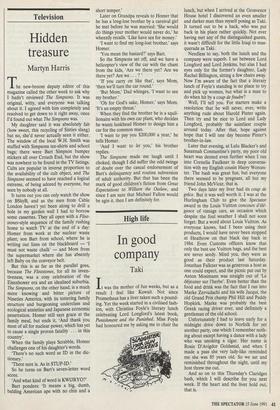Television
Hidden treasure
Martyn Harris
The new-broom deputy editor of this magazine called the other week to ask why I hadn't reviewed The Simpsons. It was original, witty, and everyone was talking about it. I agreed with him completely and resolved to get down to it right away, once I'd found out what The Simpsons was.
My daughter said it was absolutely fab (how sweet, this recycling of Sixties slang) but no, she'd never actually seen it either. The window of the local W.H. Smith was stuffed with Simpsons tee-shirts and school bags; there were Bart Simpson bumper stickers all over Crouch End, but the show was nowhere to be found in the TV listings. Cults are popular in inverse proportion to the availability of the cult object, and The Simpsons seemed to have reached a logical extreme, of being adored by everyone, but seen by nobody at all.
It turns out you can only watch the show on BSIcyB, and as the men from Cable London haven't yet been along to drill a hole in my garden wall I had to borrow some cassettes. They all open with a Flint- stones-style sequence of the family rushing home to watch TV at the end of a day: Homer from work at the nuclear waste plant; son Bart from school, where he is writing out lines on the blackboard — 'I must not waste chalk' — and Mom from the supermarket where she has absently left Baby on the conveyor belt. But this is as far as the parallel goes, because The Flintstones, for all its inven- tiveness, was a cosy celebration of the Eisenhower era and an idealised suburbia. The Simpsons, on the other hand, is a much more knowing and bitter picture of Nineties America, with its tottering family structure and burgeoning underclass and ecological anxieties and Japanese economic penetration. Homer still says grace at the family meal, but ends it, 'And thank you most of all for nuclear power, which has yet to cause a single proven fatality . . . in this country'.
When the family plays Scrabble, Homer challenges one of his daughter's words. 'There's no such word as ID in the dic- tionary.' 'There sure is. As in STUP-ID.'
So he turns on Bart's seven-letter word score.
'And what kind of word is KWIJRY0?' Bart ponders: 'It means a big, dumb, balding American ape with no chin and a short temper.'
Later on Grandpa reveals to Homer that he has a long-lost brother by a carnival girl he met before he was married: 'She would do things your mother would never do,' he wheezily recalls. 'Like have sex for money.'
'I want to find my long-lost brother,' says Homer.
'You mean the bastard?' says Bart.
So the Simpsons set off, and we have a helicopter's view of the car with the chant from the kids, 'Are we there yet? Are we there yet? Are we . . . ? '
'If you carry on like that', says Mom, 'then we'll turn the car round.'
'But Mom,' Dad whinges, 'I want to see my brother.'
'Oh for God's sake, Homer,' says Mom. 'It's an empty threat.'
When they find the brother he is a squil- lionaire with his own car plant, who decides he wants lunkhead Homer to design him a car for the common man.
'I want to pay you $200,000 a year,' he tells Homer.
'And I want to let you,' his brother replies. The Simpsons made me laugh until I choked, though I did suffer the odd twinge of doubt over the casual endorsement of Bart's delinquency and routine subversion of adult authority. But that has been the mark of good children's fiction from Great Expectations to William the Outlaw, and since I am sure that Michael Fallon would be agin it, then I am definitely for.


















































 Previous page
Previous page